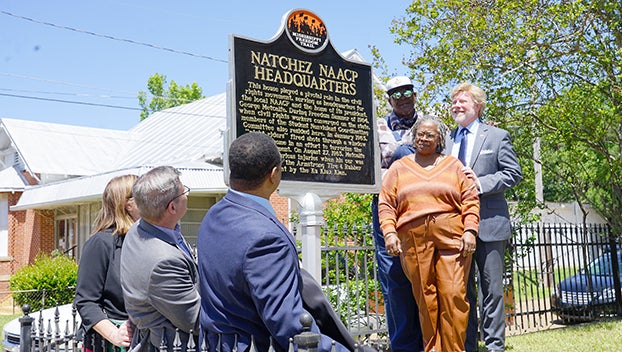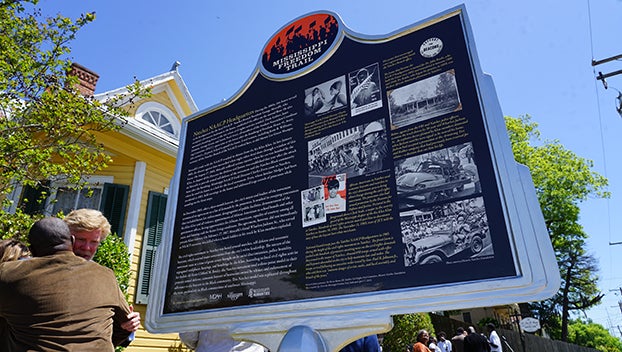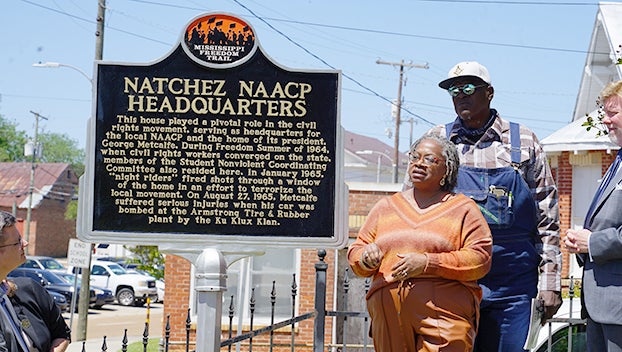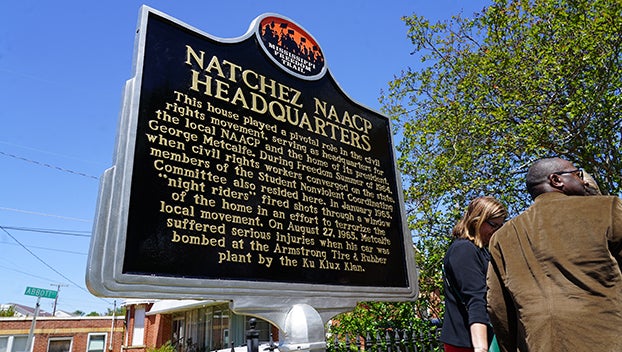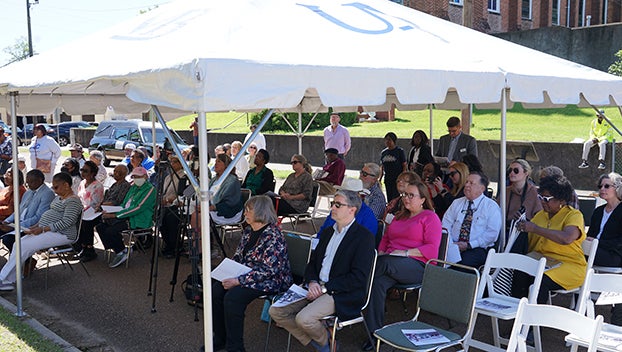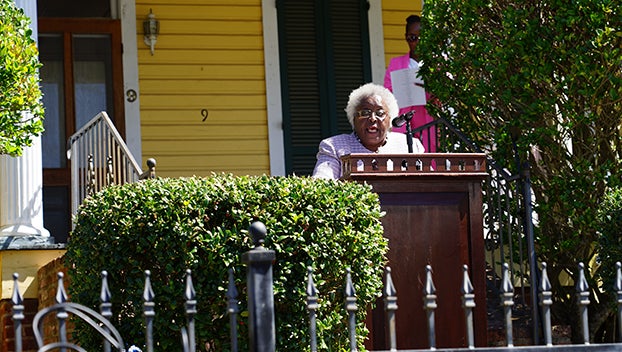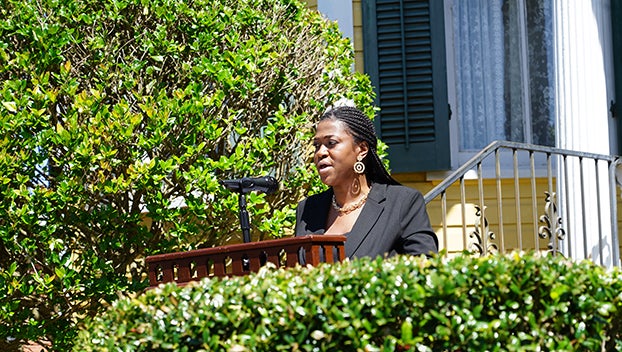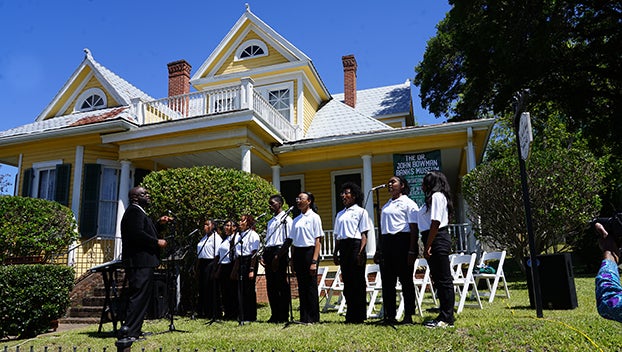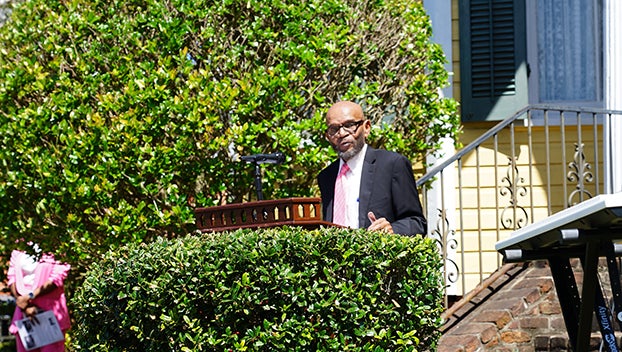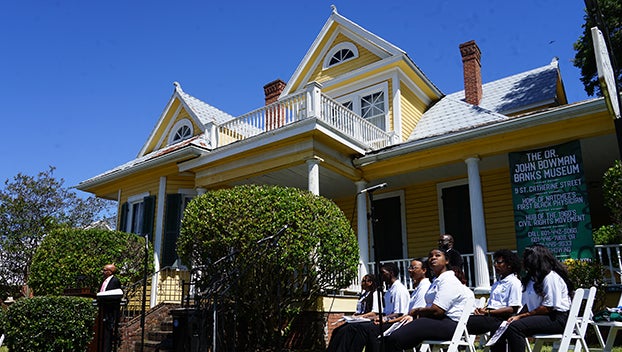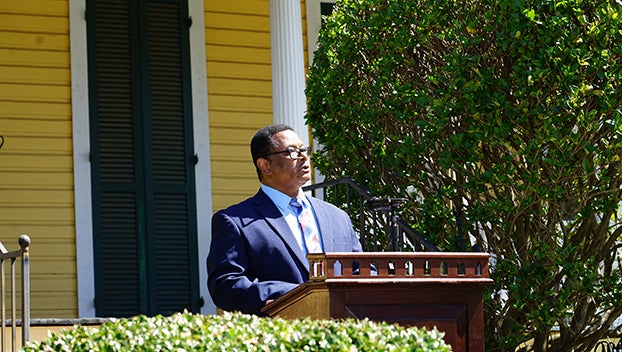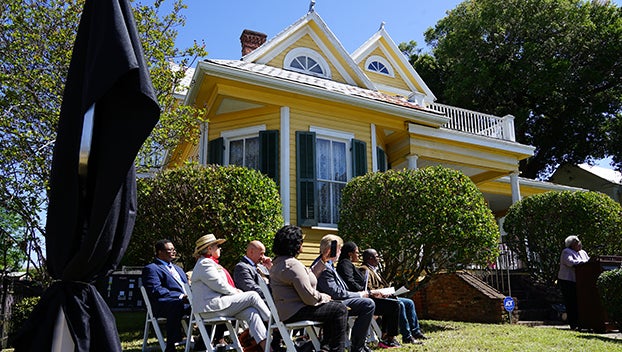ROAD TO FREEDOM: Natchez’s Banks House joins National Civil Rights Trail, Mississippi Freedom Trail
Published 11:29 am Tuesday, April 18, 2023
|
Getting your Trinity Audio player ready...
|
NATCHEZ — Since the Mississippi Freedom Trail was established in 2011, 30 markers have been spread throughout the state, recognizing the people, places, and events that were instrumental in the civil rights movement. Natchez was not on that list, until now.
Approximately 100 people gathered Monday at Dr. John Banks House at 9 Saint Catherine St., the former home of Natchez’s first African American physician and headquarters of the Natchez chapter of the National Association for the Advancement of Colored People.
During the 1960s, the house played a pivotal role in the civil rights movement, including serving as a boarding house for civil rights activists.
“Today, we are gathered in a special place in our history and a sacred space in our city, for it was here that the seeds for freedom and a brighter future for African Americans were planted,” said Roscoe Barnes, the cultural heritage and tourism manager for Visit Natchez. “That said, I want to stress that today’s event is only possible because of the people, the leaders and activists of the Civil Rights movement who worked in this house and throughout the city in the struggle for freedom and justice. There were many who suffered. Some lost their lives.”
Barnes said he was part of a group of volunteers who formed the Natchez Civil Rights Trail Committee.
“We knew about the importance of the Civil Rights Movement in Natchez, but we were surprised the city was not listed on the Mississippi Freedom Trail or the U.S. Civil Rights Trial,” he said. “We wanted to change that, so we got to work. After several months of research and discussions, we selected this site as the one that was the most pivotal in the movement. And so here we are, by God’s grace.”
“While each site on the Mississippi Freedom Trail is an important landmark in Mississippi’s civil rights struggle, this house was a central hub of activity for many men and women who fought for equality during those trying times in our nation’s history,” said Visit Mississippi Director Craig Ray. “We are proud to recognize their efforts and their accomplishments with this Freedom Trail marker, which will serve to keep their story alive while educating its visitors for many generations to come.”
The event included musical interludes by the Natchez High School choir and comments from special guest speaker Daphne R. Chamberlain, Ph.D., an associate professor of History at Tougaloo College.
“Mississippi has a rich civil rights history that has shaped the local and national narrative of the freedom movement,” Chamberlain said. “The Natchez story is integral to that narrative, illustrating how a tradition of organizing at the grassroots level dismantled Jim Crow and changed Natchez and Mississippi for the better. This Freedom Trail Marker is a preservation of that history and a testament to the dedication of people who sought to make their community a just and equitable place to live for future generations.”
In his remarks, former Natchez mayor Phillip West, who was also a past president of the NAACP and the first Black mayor elected in Natchez since reconstruction, said at times, events such as these “irritate old wounds” from a much darker time he experienced in Natchez’s history.
“I went to Alcorn State University right after I had been almost killed by the Ku Klux Klan, myself and my father in 1965.”
George Metcalf, who was then the president of the NAACP and living at the Banks House, survived a bomb hidden inside his car that same year. One year prior, two young college students, Charles Moore and Henry Dee, were kidnapped by the White Knights of the Ku Klux Klan, beaten and drowned in the backwaters of the Mississippi River, West recalled. The case was, for the most part, ignored by authorities until years later.
“We didn’t have Black law enforcement protection,” West said. “My dad reminded me that when I was 40 years old, he had to tell a young white kid ‘yes sir’ and ‘no sir.’ The reason he had to do that was because it was open season in our community. We had no protection. In order for them to survive, they had to do certain things they didn’t want to do. And when they didn’t do those things, they had to leave town.
“The NAACP has always been a leader at the forefront of trying to acquire equal justice under the law and equal opportunity. I know this marker is going to symbolize and represent the pain that we experienced in the past, the progress that we are experiencing right now and a shared vision of how we can all get there together.”
West said even now, the fight for equality continues.
“There are people in this community, in this state and in this nation who don’t want to see us be together,” he said. “They don’t want to see us where we all are judged based on the content of our character and not the color of our skin. There are people who don’t want to see that happen, but we must fight for it. … The struggles and the suffering that we’ve endured will not be over until all of God’s children … will be able to sing, ‘We are finally free at last. We are finally free at last.’”
Felicia Bridgewater-Irving, Alderwoman of Ward 4 in which the Banks House is located, said all of St. Catherine Street “embodies the story of African American struggle from slavery to freedom” from Forks of the Road where once the second largest slave trade in the nation existed to the Zion Chapel AME Church, which had been pastored by Hiram Rhodes Revels, the first African American to serve in Congress.
The marker commemorates the efforts of those civil rights activists who used the house to help plan and organize events throughout the 1960s.
Despite acts of violence targeting the house and its occupants, activists continued to use the site for their activities, including Freedom Summer of 1964 and as a meeting place for NAACP Field Director Charles Evers.
“The city of Natchez is so excited about finally achieving placement on the Mississippi Freedom Trail. The civil rights history that exists here in Mississippi’s oldest municipality is truly amazing,” said Natchez Mayor Dan M. Gibson. “I am grateful to be where I am, for such a time as this, as we work to better tell our whole story. It is important to everyone that this history be told, properly understood, and appreciated.”
The unveiling was also attended by the Rev. Joseph Logan of Rose Hill Missionary Baptist Church, the Rev. Clifton Marvel Sr. of Greater Macedonia Baptist Church, and Devin Heath of Visit Natchez.
Today, the Banks House is owned by Rose Hill Missionary Baptist Church.
“‘Ships are safest at port, but ships were not designed to stay at port.’ I heard this statement at a program in North Carolina and it has been profound to me through the years,” said church representative Dora Hawkins. “… We welcome you to this port today and we pray that on your way back to your port as you get busy spreading the word … about the history of Natchez and what Natchez has to offer, we hope that you will feel welcome to come back.”
Helping to unveil the marker were Denise Jackson Ford and Wharlest Jackson Jr., both children of the slain civil rights leader Wharlest Jackson, an NAACP treasurer who died in a 1967 car bombing just after he received a job promotion at Armstrong Tire & Rubber Company. No one was ever charged with Jackson’s racially motivated murder and the case remains unsolved to this day.
“He sacrificed his life not just for his family but for the community in the City of Natchez and the State of Mississippi,” Ford said.
“People reject the cornerstone, but the same cornerstone you reject shall be the chief cornerstone. Our father gave his life because he loved this community. He loved people,” Jackson Jr. added. “The fruit of his labor in this town is here.”
The Mississippi Freedom Trail is administered by Visit Mississippi in partnership with the Mississippi Humanities Council.
Support for this collaboration is made possible by a State Tourism Grant from the U.S. Economic Development Administration.


